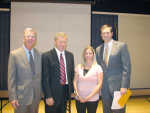State chamber: Nebraska fares well in some business rankings; tax reform needed

McCOOK, Nebraska -- Despite poor business tax climate and individual income tax rankings, Nebraska was ranked for the first time ever in the top five of "CNBC's Best States for Business" this summer. Nebraska climbed two spots from 2012, and 18 spots since 2008, to reach the number four ranking in 2013, behind South Dakota, Texas and North Dakota, respectively.
Nebraska Chamber of Commerce and Industry representatives touted the ranking during their annual legislative breakfast at McCook Community College this morning.
The ranking was based on 51 competitiveness measures and Nebraska scored well in areas of business friendliness, economy, quality of life and cost of living, according to state chamber vice president Jamie Karl.
CNBC noted the rankings identified a trend of the nation's economic hub "moving to the center of the country."
Karl said Nebraska scored poorly in areas pertaining to access to capital, technology and innovation.
Nebraska similarly received their highest ranking ever from the Pollina Corporate Study in July. Karl said Ron Pollina was a corporate real estate expert in Chicago and Nebraska received high marks for its jobless rate, right to work laws and legal environment.
Business tax climate continues to be a weakness for Nebraska in national rankings. Nebraska fell one spot to a ranking of 31 out of 50 states ranked by the Tax Foundation in 2013. Karl said corporate, individual, sales, unemployment and property taxes were the five categories ranked by the tax foundation.
Nebraska fell two spots to receive a ranking of 35 in the Tax Foundations annual Individual Income Tax rankings.
"All our neighboring states out perform us except Iowa," said Karl, adding that Iowa had a much higher threshold of $67,000, compared to Nebraska's $27,000, before tax payers reached the state's highest income tax rate.
Karl said legislators could reduce either reduce the rate or increase the threshold to improve Nebraska's ranking.
Karl said Nebraska was one of only six western states in the bottom half of national income tax rankings.
Nebraska was similarly ranked 32 when comparing state Corporate Tax top rates and has remained their for four straight years.
Karl also pointed out that Nebraska was ranked fourth in the nation in CNBC's annual "Quality of Life" rankings, which are based on factors of crime, health care, attractions and environment. Hawaii was ranked the best in the nation.
State chamber president Barry Kennedy provided a recap of bills enacted by the Nebraska legislature in 2013 which would likely have an impact on state businesses. The repeal of LB 308 should improve Nebraska's standing in future tax climate comparisons, according to Kennedy.
LB 308 created Nebraska's alternative minimum tax in the 1960s and was intended to target very wealthy taxpayers, but had begun to threaten middle class taxpayers with high deductions. Prior to the repeal Nebraska had been one of only nine states still imposing an AMT, according to Kennedy.
Kennedy said he hopes a second bill, LB 104, will bring more wind energy to Nebraska. The bill extends sales tax refunds for large investment in renewable energy to the wind energy industry. Nebraska is ranked fourth in the nation in wind resources but trails neighboring states in generation, according to Kennedy.
